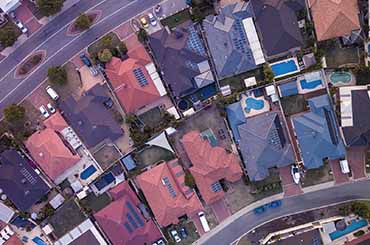- Market services
-
Compliance audits & reviews
Our audit team undertakes the complete range of audits required of Australian accounting laws to help you to help you meet obligations or fulfil best practice procedures.
-
Audit quality
We are fiercely dedicated to quality, use proven and globally tested audit methodologies, and invest in technology and innovation.
-
Financial reporting advisory
Our financial reporting advisory team helps you understand changes in accounting standards, develop strategies and communicate with your stakeholders.
-
Audit advisory
Grant Thornton’s audit advisory team works alongside our clients, providing a full range of reviews and audits required of your business.
-
Digital assurance
We capture actionable, quality insights from data within your financial reporting and auditing processes.

-
Corporate tax & advisory
We provide comprehensive corporate tax and advisory service across the full spectrum of the corporate tax process.
-
Private business tax & advisory
We work with private businesses and their leaders on all their business tax and advisory needs.
-
Tax compliance
We work alongside clients to manage all tax compliance needs and identify potential compliance or tax risk issues.
-
Employment tax
We help clients understand and address their employment tax obligations to ensure compliance and optimal tax positioning for their business and employees.
-
International tax
We understand what it means to manage tax issues across multiple jurisdictions, and create effective strategies to address complex challenges.
-
GST, stamp duty & indirect tax
Our deep technical knowledge and practical experience means we can help you manage and minimise the impact of GST and indirect tax, like stamp duty.
-
Tax law
Our team – which includes tax lawyers – helps you understand and implement regulatory requirements for your business.
-
Innovation Incentives
Our national team has extensive experience navigating all aspects of the government grants and research and development tax incentives.
-
Transfer pricing
Transfer pricing is one of the most challenging tax issues. We help clients with all their transfer pricing requirements.
-
Tax digital consulting
We analyse high-volume and unstructured data from multiple sources from our clients to give them actionable insights for complex business problems.
-
Corporate simplification
We provide corporate simplification and managed wind-down advice to help streamline and further improve your business.
-
Superannuation and SMSF
Increasingly, Australians are seeing the benefits, advantages and flexibility of taking control of their own superannuation and retirement planning.

-
Payroll consulting & Award compliance
Many organisations are grappling with a myriad of employee agreements and obligations, resulting in a wide variety of payments to their people.
-
Cyber resilience
The spectrum of cyber risks and threats is now so significant that simply addressing cybersecurity on its own isn’t enough.
-
Internal audit
We provide independent oversight and review of your organisation's control environments to manage key risks, inform good decision-making and improve performance.
-
Financial crime
Our team helps clients navigate and meet their obligations to mitigate crime as well as develop and implement their risk management strategies.
-
Consumer Data Right
Consumer Data Right (CDR) aims to provide Australians with more control over how their data is used and disclosed.
-
Risk management
We enable our clients to achieve their strategic objectives, fulfil their purpose and live their values supported by effective and appropriate risk management.
-
Controls assurance
In Australia, as with other developed economies, regulatory and market expectations regarding corporate transparency continue to increase.
-
Governance
Through fit for purpose governance we enable our clients to make the appropriate decisions on a timely basis.
-
Regulatory compliance
We enable our clients to navigate and meet their regulatory and compliance obligations.

-
Forensic accounting and dispute advisory
Our team advises at all stages of a litigation dispute, taking an independent view while gathering and reviewing evidence and contributing to expert reports.
-
Investigations
Our licensed forensic investigators with domestic and international experience deliver high quality results in the jurisdictions in which you operate.
-
Asset tracing investigations
Our team of specialist forensic accountants and investigators have extensive experience in tracing assets and the flow of funds.

-
Mergers and acquisitions
Our mergers and acquisitions specialists guide you through the whole process to get the deal done and lay the groundwork for long-term success.
-
Acquisition search & strategy
We help clients identify, finance, perform due diligence and execute acquisitions to maximise the growth opportunities of your business.
-
Selling a business
Our M&A team works with clients to achieve a full or partial sale of their business, to ensure achievement of strategic ambitions and optimal outcomes for stakeholders.
-
Operational deal services
Our operational deal services team helps to ensure the greatest possible outcome and value is gained through post merger integration or post acquisition integration.
-
Transaction advisory
Our transaction advisory services support our clients to make informed investment decisions through robust financial due diligence.
-
ESG and sustainability due diligence
As environmental, social, and governance (ESG) considerations become increasingly pivotal for dealmakers in Australia, it is important for investors to feel confident in assessing transactions through an ESG lens.
-
Business valuations
We use our expertise and unique and in-depth methodology to undertake business valuations to help clients meet strategic goals.
-
Tax in mergers & acquisition
We provide expert advice for all M&A taxation aspects to ensure you meet all obligations and are optimally positioned.

-
Corporate finance
We provide effective and strategic corporate finance services across all stages of investments and transactions so clients can better manage costs and maximise returns.
-
Debt advisory
We work closely with clients and lenders to provide holistic debt advisory services so you can raise or manage existing debt to meet your strategic goals.
-
Working capital optimisation
Our proven methodology identifies opportunities to improve your processes and optimise working capital, and we work with to implement changes and monitor their effectiveness.
-
Capital markets
Our team has significant experience in capital markets and helps across every phase of the IPO process.
-
Debt and project finance raising
Backed by our experience accessing full range of available funding types, we work with clients to develop and implement capital raising strategies.
-
Private equity
We provide advice in accessing private equity capital.
-
Financial modelling
Our financial modelling advisory team provides strategic, economic, financial and valuation advice for project types and sizes.
-
Payments advisory
We provide merchants-focused payments advice on all aspects of payment processes and technologies.

-
Voluntary administration & DOCA
We help businesses considering or in voluntary administration to achieve best possible outcomes.
-
Corporate insolvency & liquidation
We help clients facing corporate insolvency to undertake the liquidation process to achieve a fair and orderly company wind up.
-
Complex and international insolvency
As corporate finance specialists, Grant Thornton can help you with raising equity, listings, corporate structuring and compliance.
-
Safe Harbour advisory
Our Safe Harbour Advisory helps directors address requirements for Safe Harbour protection and business turnaround.
-
Bankruptcy and personal insolvency
We help clients make informed choices around bankruptcy and personal insolvency to ensure the best personal and stakeholder outcome.
-
Creditor advisory services
Our credit advisory services team works provides clients with credit management assistance and credit advice to recapture otherwise lost value.
-
Small business restructuring process
We provide expert advice and guidance for businesses that may need to enter or are currently in small business restructuring process.
-
Asset tracing investigations
Our team of specialist forensic accountants and investigators have extensive experience in tracing assets and the flow of funds.

-
Independent business reviews
Does your company need a health check? Grant Thornton’s expert team can help you get to the heart of your issues to drive sustainable growth.
-
Commercial performance
We help clients improve commercial performance, profitability and address challenges after internal or external triggers require a major business model shift.
-
Safe Harbour advisory
Our Safe Harbour advisory helps directors address requirements for Safe Harbour protection and business turnaround.
-
Corporate simplification
We provide corporate simplification and managed wind-down advice to help streamline and further improve your business.
-
Director advisory services
We provide strategic director advisory services in times of business distress to help directors navigate issues and protect their company and themselves from liability.
-
Debt advisory
We work closely with clients and lenders to provide holistic debt advisory services so you can raise or manage existing debt to meet your strategic goals.

-
Business planning & strategy
Our clients can access business planning and strategy advice through our value add business strategy sessions.
-
Private business company secretarial services
We provide company secretarial services and expert advice for private businesses on all company secretarial matters.
-
Outsourced accounting services
We act as a third-party partner to international businesses looking to invest in Australia on your day-to-day finance and accounting needs.
-
Superannuation and SMSF
We provide SMSF advisory services across all aspects of superannuation and associated tax laws to help you protect and grow your wealth.
-
Management reporting
We help you build comprehensive management reporting so that you have key insights as your business grows and changes.
-
Financial reporting
We help with all financial reporting needs, including set up, scaling up, spotting issues and improving efficiency.
-
Forecasting & budgeting
We help you build and maintain a business forecasting and budgeting model for ongoing insights about your business.
-
ATO audit support
Our team of experts provide ATO audit support across the whole process to ensure ATO requirements are met.
-
Family business consulting
Our family business consulting team works with family businesses on running their businesses for continued future success.
-
Private business taxation and structuring
We help private business leaders efficiently structure their organisation for optimal operation and tax compliance.
-
Outsourced CFO services
Our outsourced CFO services provide a full suite of CFO, tax and finance services and advice to help clients manage risk, optimise operations and grow.
-
ESG, sustainability and climate reporting
There is a growing demand for organisations to provide transparency on their commitment to sustainability and disclosure of the nonfinancial impacts of their business activities. Commonly, the responsibility for sustainability and ESG reporting is landing with CFOs and finance teams, requiring a reassessment of a range of reporting processes and controls.
-
ESG, sustainability and climate advisory
With the ESG and sustainability landscape continuing to evolve, we are focussed on helping your business to understand what ESG and sustainability represents and the opportunities and challenges it can provide.
-
ESG, sustainability and climate reporting assurance
As the demand for organisations to prepare information in relation to ESG & sustainability continues to increase, through changes in regulatory requirements or stakeholder expectations, there is a growing need for assurance over the information prepared.
-
ESG and sustainability due diligence
As environmental, social, and governance (ESG) considerations become increasingly pivotal for dealmakers in Australia, it is important for investors to feel confident in assessing transactions through an ESG lens.

-
Management consulting
Our management consulting services team helps you to plan and implement the right strategy to deliver sustainable growth.
-
Financial consulting
We provide financial consulting services to keep your business running so you focus on your clients and reaching strategic goals.

-
China practice
The investment opportunities between Australia and China are well established yet, in recent years, have also diversified.
-
Japan practice
The trading partnership between Japan and Australia is long-standing and increasingly important to both countries’ economies.
-
India practice
It’s an exciting time for Indian and Australian businesses looking to each jurisdiction as part of their growth ambitions.
-
Singapore practice
Our Singapore Practice works alongside Singaporean companies to achieve growth through investment and market expansion into Australia.
-
Vietnam practice
Investment and business opportunities in Vietnam are expanding rapidly, driven by new markets, diverse industries, and Vietnam's growing role in export manufacturing, foreign investment, and strong domestic demand.

-
 Client Alert Unlock 2025: government grants updateIf government grants are part of your 2025 strategy, take note of the available quarter one funding opportunities. With increasing inflationary pressures, government grants can be an essential alternative funding source for businesses with critical investment projects.
Client Alert Unlock 2025: government grants updateIf government grants are part of your 2025 strategy, take note of the available quarter one funding opportunities. With increasing inflationary pressures, government grants can be an essential alternative funding source for businesses with critical investment projects. -
 Report Agribusiness, Food & Beverage Dealtracker 2024Merger & Acquisition (M&A) and equity market activity in the Agribusiness, Food & Beverage (Ag, F&B) sector is undergoing a strategic shift, as investors have become more selective and increasingly cautious in response to global economic uncertainty.
Report Agribusiness, Food & Beverage Dealtracker 2024Merger & Acquisition (M&A) and equity market activity in the Agribusiness, Food & Beverage (Ag, F&B) sector is undergoing a strategic shift, as investors have become more selective and increasingly cautious in response to global economic uncertainty. -
 Client Alert Government Grants in FY25As we embark on a new financial year, it’s crucial to take a strategic approach to understanding the government grants landscape.
Client Alert Government Grants in FY25As we embark on a new financial year, it’s crucial to take a strategic approach to understanding the government grants landscape. -
 Client Alert Consultation on foreign resident CGT rules commencesTreasury is taking steps to ensure fairer tax treatment for foreign resident investors by tightening Australia's foreign resident Capital Gains Tax (CGT) regime. Proposed changes aim to broaden the CGT base and enhance integrity, impacting infrastructure, energy, agriculture, and more.
Client Alert Consultation on foreign resident CGT rules commencesTreasury is taking steps to ensure fairer tax treatment for foreign resident investors by tightening Australia's foreign resident Capital Gains Tax (CGT) regime. Proposed changes aim to broaden the CGT base and enhance integrity, impacting infrastructure, energy, agriculture, and more.
-
Renewable Energy
Transformation through energy transition

-
Flexibility & benefits
The compelling client experience we’re passionate about creating at Grant Thornton can only be achieved through our people. We’ll encourage you to influence how, when and where you work, and take control of your time.
-
Your career development
At Grant Thornton, we strive to create a culture of continuous learning and growth. Throughout every stage of your career, you’ll to be encouraged and supported to seize opportunities and reach your full potential.
-
Diversity & inclusion
To be able to reach your remarkable, we understand that you need to feel connected and respected as your authentic self – so we listen and strive for deeper understanding of what belonging means.
-
In the community
We’re passionate about making a difference in our communities. Through our sustainability and community engagement initiatives, we aim to contribute to society by creating lasting benefits that empower others to thrive.
-
Graduate opportunities
As a new graduate, we aim to provide you more than just your ‘traditional’ graduate program; instead we kick start your career as an Associate and support you to turn theory into practice.
-
Vacation program
Our vacation experience program will give you the opportunity to begin your career well before you finish your degree.
-
The application process
Applying is simple! Find out more about each stage of the recruitment process here.
-
FAQs
Got questions about applying? Explore frequently asked questions about our early careers programs.
-
Our services lines
Learn about our services at Grant Thornton
-
Current opportunities
Current opportunities
-
Remarkable people
Our team members share their remarkable career journeys and experiences of working at Grant Thornton.
-
Working at Grant Thornton
Explore our culture, benefits and ways we support you in your career.
-
Current opportunities
Positions available.
-
Contact us
Get in touch
As with most State Budgets announced so far, NSW’s economy has recovered much faster than anticipated and is one of the healthiest budgets as we come out of the Pandemic. The State’s unemployment rate is down to 5% from its peak of 7.1% in July 2020. Gross Domestic Product is up 1.1% over the last 12 months – however, it is important to note that the booming Sydney property market accounts for a significant proportion of the increase in expected revenue after the State collected an additional $1b.
In addition to expenditure, there was also a strong reform platform with a new school curriculum in the works and a potential pilot program to stagger school times to help boost productivity and provide more flexibility for shift workers. Stricter deadlines for subcontractor payments have also been introduced.
Nothing was announced around the proposal to replace stamp duty with an annual land tax as more consultation is happening in the background. We expect to hear more on this in the next coming months.
A complementary announcement was the introduction of the Environmental Planning and Assessment (Infrastructure Contributions) Bill 2021 which outlines four key reforms to fund infrastructure investment, which includes the introduction of a land value contribution payable by developers by reference to the increase in land value arising from planning decisions.
Key highlights
- $108.5b in infrastructure investment over four years.
- More than $40b towards health and mental health – including $1.1b to support the State’s response to COVID-19.
- $24.4b towards “lifelong learning” – including $2.6b towards transforming the VET sector and $725m direct investment into Early Childhood Education.
- $6b in rebates, concessions and cost of living measures for Australian households.
- $1.3b towards Arts, Screens and Culture.
- $500m plan for battery-powered cars to constitute more than half of all new car sales by 2031.
- $416m to Investment NSW to attract investment and R&D into the State.
- $261.4m over four years to double the footprint of NSW’s international network and support businesses here and overseas.
- $20m over four years for rezonings across 12 major precincts across Greater Sydney to create better connected communities and support employment opportunities.
Stricter deadlines for subcontractor payments
While not strictly a budget measure itself, the NSW Government has outlined new regulations which require any large businesses with a NSW government contract valued at more than $7.5m to pay subcontractors within 22 business days. This new measure specifically addresses the cash flow issues that small businesses face and complements the Payment Times Reporting requirements for large organisations.
Revenue Measures
After a decline last year, Government revenue is projected to increase by 7.7% in 2020-21 to be $87.6b. This is $3.0 billion (3.5%) higher than forecast at the 2020-21 Half-Yearly Review in February, although still below pre-COVID forecasts. State revenue has been upgraded by $18.2b (4.9%) over the four years to 2024-25 since the 2020-21 Half-Yearly Review. This is largely the result of improved economic activity and residential housing activity, rather than new taxes or higher tax rates.
Motor vehicle measures
The NSW Government will introduce a road user charge (RUC) on battery, fuel cell and plug in hybrid vehicles, to commence from the earlier of 1 July 2027 or such time as battery electric vehicles comprise 30% of new vehicle sales in New South Wales. In the meantime, the Government will progressively abolish motor vehicle stamp duty on such vehicles. From 1 September 2021, new and second-hand battery electric vehicles and hydrogen fuel cell vehicles under $78,000 will be exempt from motor vehicle duty. This exemption will be extended to all, new and used electric vehicles, from the start date of the RUC.
There has been much movement in the last 6-12 months in relation to the taxation of electric vehicles, and of course, no 2 jurisdictions are the same. The current state of play of State and Territory taxation of electric vehicles is here.
Land tax surcharge compliance
Investment in system upgrades and improved data management in Revenue NSW is expected to make it easier for taxpayers to manage their surcharge land tax obligations and facilitate improved compliance (and for Revenue NSW to detect non-compliance), increasing land tax revenue by $194m over the four years to 2024-25.
Since the deadline of 31 December 2020 for taxpayers to make relevant amendments to their discretionary trust deeds, we have noticed that Revenue NSW is actively enforcing the land tax surcharge measures. We already have made a number objections on behalf of our clients in relation to what we have viewed to be incorrect assessments arising out of the increased compliance activity.
Payroll tax cuts come to an end
The temporary reduction in the payroll tax rate from 5.45% to 4.85% will continue in 2021-22 but will return to previous rates in 2022-23.
Land value contribution
A complementary announcement was the introduction of the Environmental Planning and Assessment (Infrastructure Contributions) Bill 2021 which outlines four key reforms to fund infrastructure investment, which includes the introduction of a land value contribution payable by developers by reference to the increase in land value arising from planning decisions. The new system is expected to apply to Sydney, Central Coast, Hunter Valley, Illawarra and Shoalhaven regions and is expected to be implemented by 1 July 2022.
It appears that the land value contribution will be determined by local councils during the planning phase of development, and will be included with other types of contributions required for development. Similar to Victoria, the land value contribution must be paid before land is sold, and is a charge on the land until it is satisfied. However, unlike Victoria, while there is no set fee or percentage of the contribution, there is provision for Regulations to provide for the way in which land value contributions must be calculated and the way in which value is determined.

























